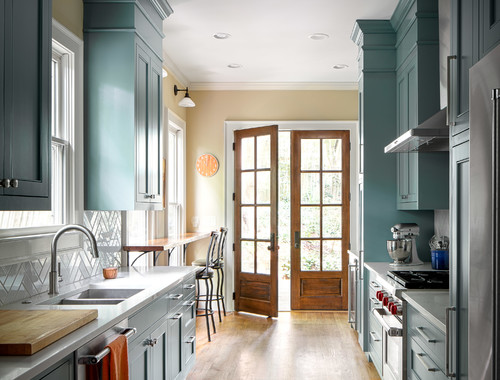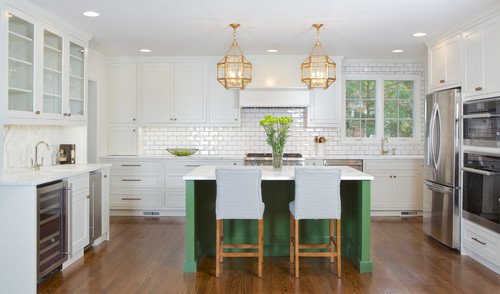Working with a Kitchen Designer in Atlanta [6 Tips for Communication]
Some of us dream of a simple and elegant transitional style kitchen, while others dream of a utilitarian yet chic industrial design. Whatever your dream, you’ll want someone to help you find, define, and design it. This is where kitchen designers in Atlanta come in. Let’s talk about how to find the right designer, how to communicate your unique style, and how to form a successful partnership on the road to your dream kitchen.
Know What’s Important to You Before You Talk to Your Designer
Good designers are great at taking your dreams and ideas and turning them into reality. But it’s important to remember that this is your kitchen. You are the only one who can determine what's most important to you. That means you'll want to take the time upfront to identify the features and elements that will make your kitchen comfortable, convenient, fun, and enjoyable.

A good designer can draw some of this out of you as you talk, but it’s really to your advantage to think through the things that will make your kitchen a place that you love. Before you get too involved with the details, think about how you plan to use your kitchen. Are you into gourmet cooking? Do you entertain a lot? Will your kitchen be a place for casual family dining? Will it be a place for kids to do homework or school projects? All of those things will have a major impact on how you design your kitchen. Your job upfront isn't to figure out how to make these things happen—it's to identify the ways you'll use your kitchen so that you can design it for those purposes.
Another important consideration is the flow of traffic within the rest of the home. Is your kitchen visible from other rooms? Will the kitchen design fit with the design in adjoining rooms? Those are all questions you'll want to consider before you start thinking about the aesthetics of the design.
How to Find the Right Atlanta-based Kitchen Designer
Often in the remodeling industry, home owners begin by selecting a designer and asking the designer for recommendations on a remodeler. But consider the opposite approach.
Your builder is the one who will actually succeed (or fail) in executing your design. Unfortunately, even a fabulous design can’t always ensure an equally fabulous execution. So your first priority should be the quality of your home’s craftsmanship.

Start by finding a high-caliber remodeler and that employs high caliber designers. Good remodelers in the Atlanta area usually have one or more in-house designers that they can provide their clients. This type of “start at the end of the maze and work your way to the beginning” approach often gets you where you want to be faster.
How to Prepare for Your First Meeting: Style
Once you have your kitchen designer in Atlanta, you’ll need to think about how to work effectively together to identify and refine your vision. The best way to do this is with thorough preparation on your end.
Before you meet, take time to search pictures on Houzz and Pinterest and create a collection of photos that speak to you. Once you have a sizable collection, look through each photo again, this time trying to identify common themes to figure out what it is you like about what you like.
Are you attracted to airy color palettes? Heavy wooden cabinets? Sleek metals? Glass backsplashes? Islands with lots of counter space? Minimalistic galley kitchens? Whatever it is, be it color, material, or a specific floorplan/layout, make a list of what you like so that you can show your designer concrete visuals and describe what it is you find appealing about those visuals.
We broke down our Top 10 Atlanta Kitchen Remodels. Here's No. 3...
How to Prepare for Your First Meeting: Function
Style is perhaps easier to think about than function because you can rely on visuals rather than tangible use. But function-oriented considerations can’t be a second place priority.

Before your first meeting, do your best to think through function-oriented design elements you can’t live without. Start by considering what you have in your kitchen now that you depend on daily—is it a double oven with a warming drawer? A second fridge and freezer unit? A designated espresso nook? Whatever it is, however small, make note of it.
Next, make a list of features and appliances you’ve seen in magazines or friends’ homes that you’ve always wanted. For now, it’s ok if you know you don’t have the space or budget for everything you want. Write it down anyway. The design phase is the time to dream big. You can work with your designer to prioritize how you’ll spend your space and money later.
Check-Ins Along the Way
With this thorough preparation in place, you’ll be in a solid position to have a productive initial meeting with your designer. You will have done your research, and all you need is to rely on your designer to guide you through best practices for realizing your dream design.

Finally, make sure that you’re communicating thoroughly and regularly. Recognize that your plan may change along the way as you see 3-D renderings and realize where you need to make adjustments. This is to be expected. It isn’t your fault for not knowing immediately everything you want, and it isn’t your designer’s fault for not intuiting it.
So be open to change. Schedule check-ins as you go. Ask questions. Tell your designer what you do and don’t like and why. Be as specific as possible. No one hits perfection the first time around, but with a little work and a lot of communication, you’ll find that winning design.
Ask Questions
We’ve all heard the admonition that there are no stupid questions. The problem is that we don’t quite believe it. None of us are eager to display our lack of knowledge. But don’t let that fear keep you from asking questions.
Your remodeler is not going to think less of you if you ask questions about the process or how to achieve what you want from your remodeling project (If that should happen, you really need to find a different remodeler!). If you don’t ask questions, your contractor will most likely assume you understand—and agree with—what’s being proposed.

How can you do that productively and helpfully? Think in terms of "How" or "What" questions rather than "Why" questions. In other words, rather than asking, "Why are you planning to do it that way?" ask, "How can we get more natural light into the kitchen?" Or you might ask, "What's the best way to take advantage of the available space?"
In the early stages of planning and design, ask your remodeler to explain different ways he or she has approached projects similar to yours. Hearing their response may give you better insight and new ideas about how to think about your situation.
Don’t be afraid to ask for clarification. Good remodelers eat, drink, and breathe renovation and remodeling. It’s second nature to them. It may not be that way for you, so if you don’t understand something you’re being told, ask for another explanation. Remember, it’s your house. You don’t need to know how to do everything in the remodeling process, but you should understand what’s happening and how it will affect the outcome. You are a partner with your remodeler.
That’s why it’s so important to choose the right designer in the first place—and a big part of that is choosing someone with whom you are comfortable. If you’re not comfortable asking questions, you may not have the right remodeler. Here’s a post that provides specific help in asking the right questions before you choose your remodeling company.

![Working with a Kitchen Designer in Atlanta [6 Tips for Communication]](https://blog.copperskyrenovations.com/hubfs/Blog_Images/HaworthKitchen2.jpg)

